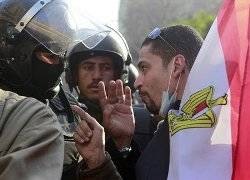Deadly clashes in Cairo and elsewhere in Egypt have entered their fourth day, as anger at the ruling military continues to boil after 72 people died in football-related violence.
Egypt's tax authority building in central Cairo was set on fire as the street protests against army rule raged into the early hours of Sunday, state television footage showed.
Parts of the building, close to the interior ministry, were set ablaze, media said.
Dozens of protesters remained in Mohamed Mahmoud street on Sunday morning, where riot police continued to occasionally fire tear gas to prevent the crowds from reaching the interior ministry building a few blocks away.
Police fired tear gas and birdshot at protesters throughout Saturday, after protesters threw stones at officers guarding the ministry, which is hundreds of meters from the capital's Tahrir Square.
In the canal city of Suez, two people died from wounds sustained in clashes overnight, medics said. The health ministry said 2,532 people have been injured since the violence erupted.
Five people were also hurt in overnight clashes outside police headquarters in the Mediterranean city of Alexandria, the official MENA news agency reported.
'Security vacuum'
Violence began after a Wednesday football riot in Port Said that left at least 72 dead was blamed on poor security and intentional plan to set fans from one side against the other.
Anger quickly focused on the Supreme Council of the Armed Forces (SCAF) - which has ruled Egypt since the ousted of ex-President Hosni Mubarak - and marchers took to the streets nationwide on Friday to demand that the generals cede power immediately.
Protesters, many of them organized supporters of Cairo's main football clubs known as the ultras, held up a huge banner to the police that read: "Those who didn't deserve to die have died at the hands of those who don't deserve to live."
Many of the dead in Wednesday's football riot in the northern city of Port Said were thought to have been Al-Ahly supporters, set upon by supporters of the local Al-Masry side after the home team won 3-1.
The ultras played a prominent role among anti-government elements in the uprising that toppled president Hosni Mubarak a year ago, and commentators and citizens have suggested pro-Mubarak forces were behind the incident, or at least complicit.
Al Jazeera's Rawya Rageh, reporting from Cairo on Friday, said that a cleric leading prayers in Tahrir Square questioned where the security forces were when the Port Said bloodshed happened.
"The people wanted answers as to how exactly the football disaster happened," she said. "The question is, what exactly was the responsibility of the governor and the head of the police force there?"
"Furthermore, why did the police force, as seen on cameras, remain on the sidelines and not engage the crowds?"
'Foreign hands'
In the ongoing aftermath, rocks and stones flew in all directions on Friday as police vans in Cairo repeatedly charged demonstrators.
At one point, police clubbed protesters just meters away from the interior ministry.
A soldier injured outside the interior ministry on Thursday died in hospital on Friday, MENA said.
In a sign of increased insecurity, armed assailants carrying automatic weapons stormed a police station in al-Marg, east Cairo, freeing detainees before torching it.
In the Dokki neighborhood, a group of men attacked a police station, taking weapons from the building.
Al Jazeera’s Sue Turton, reporting from Cairo, said the ongoing nationwide protests are "another symptom of the security vacuum going on across the country".
The SCAF blamed the unrest on "foreign and domestic hands targeting the country".
In a statement on Facebook, it urged "all political and national forces of this great nation to take a national and historic role and intervene ... to return stability".
The military has pledged to cede full powers to civilian rule when a president is elected by the end of June, but its opponents believe it intends to hold on to power behind the scenes after a transfer to civilian rule.
Spreading unrest
Fans of the home side, Al Masry, stormed the pitch after a 3-1 victory against visiting favorites Al Ahly.
Witnesses said security forces had allowed men into the stadium carrying knives and sticks. Though the majority of deaths reportedly came from those crushed or forced to fall off of terraces during the stampede, some were reportedly stabbed to death.
At least 52 people have been arrested and authorities said the search for suspects linked to the violence was continuing.
The stampede capped a week of violence in which several armed robberies and kidnappings were reported across Egypt, leading some to suspect the government had arranged the escalating chaos in an attempt to convince citizens of the need to maintain harsh emergency laws.
Pipeline attack
In a separate development, a gas pipeline running from Egypt to Israel was blown up on Sunday west of the Mediterranean coastal town of el-Arish.
Gas pumping was stopped, and security and fire fighting forces were responding to the scene.
The pipeline has been attacked at least 12 times since Mubarak stepped down. Many Egyptians are angry that Israel is able to purchase gas at allegedly reduced prices.
In the Sinai, the brief abduction on Friday of two US tourists and their guide by masked gunmen dealt a new blow to Egypt's already hard-hit tourism sector, despite their release unharmed several hours later.
Rageh said they were taken "by a Bedouin tribe that has been protesting over the past couple of months ... and is certainly part of larger breakdown in security ... an explosion in incidents from kidnappings to armed robberies".
PHOTO CAPTION
A protester argues with a policeman as they try to prevent fellow protesters from throwing stones at riot police during clashes near the Interior Ministry in Cairo February 4, 2012.
Al-Jazeera


 Home
Home Discover Islam
Discover Islam Quran Recitations
Quran Recitations Lectures
Lectures
 Fatwa
Fatwa Articles
Articles Fiqh
Fiqh E-Books
E-Books Boys & Girls
Boys & Girls  Articles
Articles










